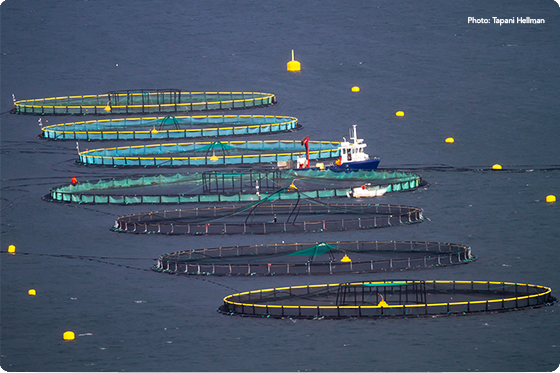Blog
-
Don’t Cage Our Oceans: Challenging the Army Corps’ Nationwide Permit for Commercial Finfish Aquaculture
- July 1st, 2024 — by Collin Dowson — Category: Aquaculture
- Tweet
-

In 2022, several environmental advocacy groups sued the U.S. Army Corps of Engineers (Corps) for its decision to issue Nationwide Permit (NWP) 56.1 NWP 56 is a general permit issued by the Corps under the Clean Water Act (CWA) for commercial finfish aquaculture. It authorizes the construction of structures in marine and estuarine waters and the use of items such as net pens and cages for the cultivation of finfish. The Plaintiffs claim that the Corps’ conclusion that NWP 56 will have only a minimal adverse environmental impact is arbitrary and capricious, and that the permit should be set aside as unlawful. In the past two years, both parties have filed documents with the court outlining their arguments, but the case has yet to reach trial, with the first oral arguments set to be held in July of this year.
The Plaintiffs claim that the Corps violated the U.S. Constitution’s Property Clause, which gives Congress the exclusive right to control Federal property, by granting individuals permits to conduct aquaculture on the outer continental shelf.2 They also claim that the Outer Continental Shelf Lands Act (OCSLA) only allows leases to be granted for the purposes of mineral extraction and energy projects.3 The Corps responded to this argument first by stating that NWP 56 does not grant property rights, and that any permittees would have to obtain such rights from another source.4 Second, the Corps said that Plaintiffs are misconstruing OCSLA, and points to Congressional language which indicates that the act was not meant to limit the kinds of projects which can be permitted.5
The Plaintiffs also allege that the Corps failed to perform adequate analyses under a host of environmental laws, including the National Environmental Policy Act (NEPA), the Endangered Species Act (ESA), and the Rivers and Harbors Act (RHA). They argue that much of the required analysis was either entirely absent from the Corps’ decision document, or present but vague and conclusory in nature. One particular issue the Plaintiffs point to is the Corps’ reliance on District Engineers, the local officials who approve or deny projects, to prevent impacts on a case-by-case basis. Plaintiffs liken this arrangement to the one struck down in Coalition to Protect Puget Sound Habitat v. U.S. Army Corps, where the court determined that while the Corps could use District Engineers to “cement” their national determination of no significant impact, they could not exclusively rely on local determinations to avoid doing a national analysis.6
Here, the Corps argues that the analysis it performed was as complete and robust as possible for a newly forming national program, and that many of their statements were only able to be predictive in nature.7 It also argues that the comparison Plaintiffs draw to Coalition to Protect Puget Sound is misplaced, because, unlike in that case, the national analysis conducted for NWP 56 is detailed, and the District Engineers are therefore helping to “cement” rather than being forced to analyze from scratch.8
In addition to its responses to the Plaintiffs’ claims, the Corps also raises the issue of standing. It claims that due to the kinds of injuries alleged by Plaintiffs, as well as the lack of a causal connection between NWP 56 and those injuries, there is not a legitimate case or controversy for a judge to hear.9 If the court sides with the Corps on this issue, the case will be dismissed without consideration of the Plaintiffs’ claims. If the case avoids dismissal, the court will hear oral arguments in July, and afterwards will make a ruling on the fate of NWP 56.
1 Don’t Cage Our Oceans v. United States Army Corps of Engineers, 2023 WL 6959289, 2023 LEXIS 189183 (W.D. Wash. Oct. 20, 2023).
2 Plaintiffs’ Motion for Summary Judgment and Memorandum in Support at 24, Don’t Cage Our Oceans v. United States Army Corps of Engineers, 2023 WL 6959289, 2023 LEXIS 189183 (No. 22-cv-01627).
3 Id. at 29.
4 Defendants’ Cross-Motion for Summary Judgment and Opposition to Plaintiffs’ Motion for Summary Judgment at 25, Don’t Cage Our Oceans v. United States Army Corps of Engineers, 2023 WL 6959289 2023 U.S. Dist. LEXIS 189183 (No. 22-cv-1627).
5 Id. at 24.
6 Coalition to Protect Puget Sound Habitat v. U.S. Army Corps. of Engineers, 417 F.Supp.3d 1354, 1366 (W.D. Wash. 2019).
7 Defendants’ Cross-Motion, supra note 4, at 27.
8 Id. at 29.
9 Id. at 21.
Stay Current with
Our Publications
Subscribe today to our free
quarterly publication, The SandBar
— and to our monthly newsletter,
the Ocean and Coastal Case Alert.
Blog Post Archive
2026
2025
2024
2023
2022
2021
2020
2019
2018
Blog Post Categories
Admiralty Aquaculture
Clean Water Act
COVID-19
Coastal Management
Endangered Species
Environmental Justice
Environmental Law
Fisheries
Flooding
Groundwater
Hurricanes
Insurance
Invasive Species
Litigation Briefs
Marine Debris
Marine Monuments
Miscellaneous
Natural Disasters
Offshore Energy
OSHA
PPP
Seafood
Staff
Torts
Water Quality











